
Exposé Online
What's old
Exposé print issues (1993-2011)
- 1 (October 1993)
- 2 (February 1994)
- 3 (May 1994)
- 4 (August 1994)
- 5 (October 1994)
- 6 (March 1995)
- 7 (July 1995)
- 8 (November 1995)
- 9 (March 1996)
- 10 (August 1996)
- 11 (February 1997)
- 12 (May 1997)
- 13 (October 1997)
- 14 (February 1998)
- 15 (July 1998)
- 16 (January 1999)
- 17 (April 1999)
- 18 (November 1999)
- 19 (May 2000)
- 20 (October 2000)
- 21 (March 2001)
- 22 (July 2001)
- 23 (December 2001)
- 24 (April 2002)
- 25 (September 2002)
- 26 (February 2003)
- 27 (August 2003)
- 28 (December 2003)
- 29 (April 2004)
- 30 (September 2004)
- 31 (March 2005)
- 32 (September 2005)
- 33 (May 2006)
- 34 (March 2007)
- 35 (January 2008)
- 36 (October 2008)
- 37 (July 2009)
- 38 (July 2010)
- 39 (Summer 2011)
Features
In the Present, Tense —
The Roger Trigaux Interview 1998
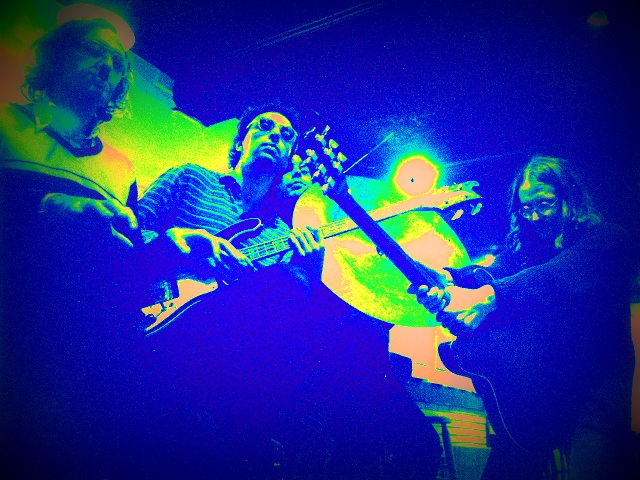
Guitarist/composer Roger Trigaux has been recording and performing his stormy brand of modern gothic sounds as leader of Present since 1980. Like many a young player coming of age during the late 60s, the Brussels native was weaned on the style of Cream and Jimi Hendrix. His first experience with international exposure came via his tenure in a masterfully innovative Belgian ensemble, whom Roger co-founded in 1973 with Daniel Denis and Guy Segers. At the time known as Necronomicon — that infamous tome of blasphemy in H.P. Lovecraft's Cthulhu Mythos — it would one year later evolve into Univers Zero, named after a novel by Belgian supernatural fantasist, Jacques Strenberg.
by Mike Ezzo, Published 1998-02-01
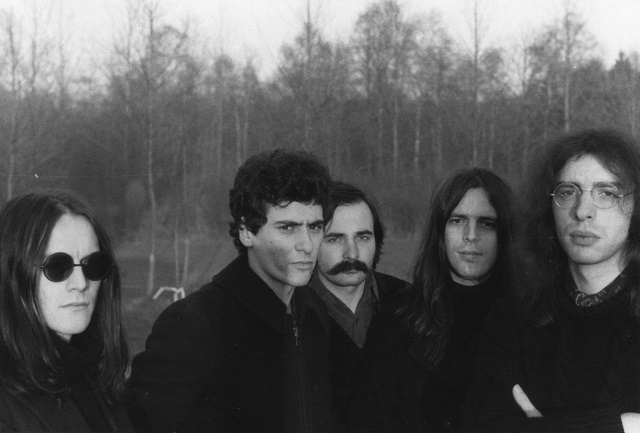 Roger stayed with Univers Zero until May, 1979, long enough to appear on the group's first two recordings. His contributions to these works — 1313 and Heresie — form an integral part of the Univers Zero canon.
Roger stayed with Univers Zero until May, 1979, long enough to appear on the group's first two recordings. His contributions to these works — 1313 and Heresie — form an integral part of the Univers Zero canon.
Merely one year after going it alone however, the seismic Present debut, Triskaidékaphobie (fear of the number thirteen) was completed. It appeared in 1980 on Atem, an independent French label/magazine conglomerate, known for its early Art Zoyd and Aksak Maboul releases. Word traveled excruciatingly slowly for Roger and his band (Why is it that music from Belgium just doesn't seem to get a fair shake?), who received nothing near the accolades they so obviously deserved. This predicament haunted many artists in the 80s: absolute doldrums... where musical pieces were shirked by major-league bands, in favor of songs, and composers of intelligent rock music were obliged to leave their aspirations at the doormat of martyrdom.
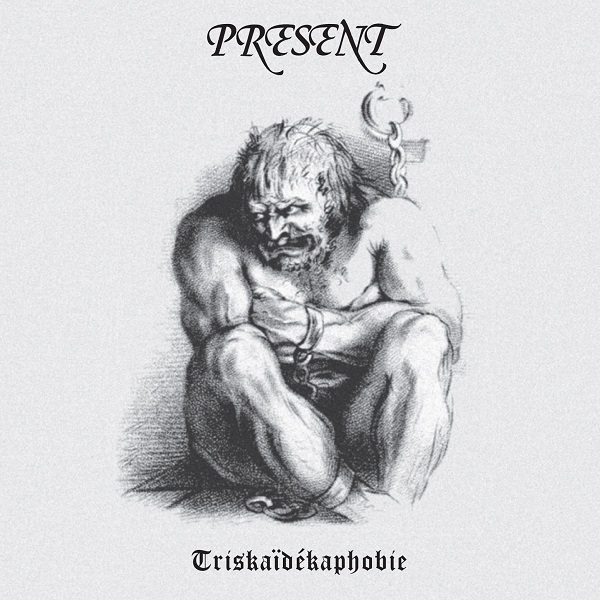 Nevertheless nothing can rescind from Trigaux the merits of Triskaidékaphobie, a work which won praise from the 'Rock in Opposition' movement. It was mainly, though not exclusively, thanks to the connection with RIO that awareness of Present's music was fostered outside of Continental Europe.
Nevertheless nothing can rescind from Trigaux the merits of Triskaidékaphobie, a work which won praise from the 'Rock in Opposition' movement. It was mainly, though not exclusively, thanks to the connection with RIO that awareness of Present's music was fostered outside of Continental Europe.
A few years later, Present began constructing the music which would become Le Poison Qui Rend Fou. Bass duties were now handled by Christian Genet, who had just begun a concomitant stint with Univers Zero as Guy Segers' replacement. A masterwork in both form and content, this is of no less significance than any of Univers Zero's finest moments. The finest example of chamber-rock you are likely to discover, Le Poison... goes tamer on the from-the-tomb Lovecraftian nocturnes; but almost more intense, if you can believe it, on the structural intricacies of the instrumental layout. Much turmoil and misfortune (chronicled in the following interview) during this period however, brought the band's activities to a crashing halt. By the time the LP was finally unleashed in 1985, Roger had already thrown in the towel and retired from music.
 In 1993, after all but giving up hope, fans were astounded by news of a new project. By this time Roger's son Reginald (also a guitarist) had developed enough to join his father in a new duo formation of Present, one that would be a catalyst in reviving Roger's career, bringing him out of the dormancy of the late 80s. Like a concerto for two guitars (supplemented with incidental percussion), 1994's C.O.D. Performance shows Roger in command of the epic, the song (well, the nine-minute "Love Scorn" is a song compared to "Alone"), and the apocalyptic. Little can escape his creative grasp. Themes evolve from the roots of interlocking dual six-string patterns and eventually implode; astounding in their precision, evocative in their emotional intensity. The use of menacing diminished-scale melodies and biting dissonances tempered by consonance, capturing high intensity but with crystal clean tone quality at low volume, will keep you on the edge of your seat.
In 1993, after all but giving up hope, fans were astounded by news of a new project. By this time Roger's son Reginald (also a guitarist) had developed enough to join his father in a new duo formation of Present, one that would be a catalyst in reviving Roger's career, bringing him out of the dormancy of the late 80s. Like a concerto for two guitars (supplemented with incidental percussion), 1994's C.O.D. Performance shows Roger in command of the epic, the song (well, the nine-minute "Love Scorn" is a song compared to "Alone"), and the apocalyptic. Little can escape his creative grasp. Themes evolve from the roots of interlocking dual six-string patterns and eventually implode; astounding in their precision, evocative in their emotional intensity. The use of menacing diminished-scale melodies and biting dissonances tempered by consonance, capturing high intensity but with crystal clean tone quality at low volume, will keep you on the edge of your seat.
Initially the father/son duo went out on tour by themselves to perform this music. One Brussels concert saw them joined by U Totem. Later however, a 1994 summer tour added old U.Z. mates Daniel Denis and Guy Segers to the fold. The following year was supposed to offer a repeat of the same, but Daniel had commitments for touring with Art Zoyd. In his place Roger recruited Dave Kerman from the 5uu's, who was in France at the time working on a 5uu's album/tour. This lineup, accompanied by Bruno Bernas on bass, recorded the Live CD, released in 1996 (reviewed in Expose #11). For a guide to the frenetic high-energy aspect of Present, it is best to steer towards this CD. On it, two previously unheard pieces are joined by reworked suites from Triskaidékephobie and C.O.D. Performance. By the time you read this, the most recent Present offering, Certitudes, should be available.
Were you born in Brussels? Did you grow up there?
Yes, I was born in this town and I have always stayed here.
Do you feel more connection to the Flemish culture, or French culture of Belgium?
Maybe the French part, since Brussels is more French than Dutch. The Belgian culture seems rather special: the northern part of Belgium is Flemish and the southern part French. Brussels, as it is the capital city of this country and, geographically, happens to be between both the cultures, has many close contacts to both Flemish and French cultures. Nevertheless, the pictorial and musical arts in Belgium have grown through the centuries (Belgium always has been a kind of crossroads: economically, and by way of invasions throughout history — French, Spanish, Austrian, German, Dutch) to become very particular due to all those different influences. That's why Belgian artists have nothing, or nearly nothing, in common with artists of the surrounding countries. For example, Belgium is the land of Surrealism, not only at an artistic level, but also in people's habits and behavior. I would say my work can be subtitled as "typical Brussels' art."
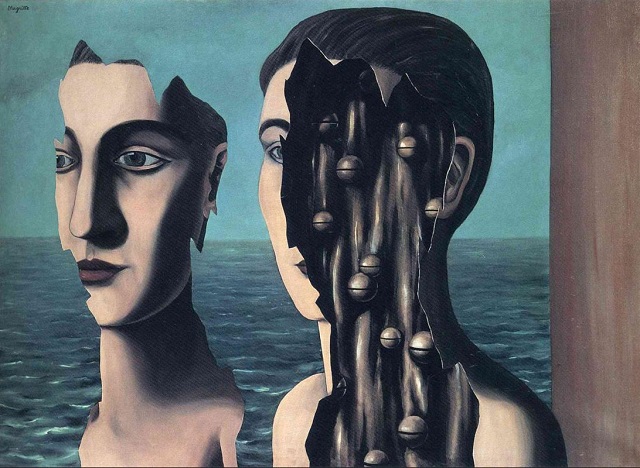 Can you tell me which Surrealist Belgian artists you are thinking of?
Can you tell me which Surrealist Belgian artists you are thinking of?
Magritte and Delvaux are the most famous.
Do you feel there is a conflict or tension between France and Belgium in the arts, music, etc.?
Differences between nationalities or art don't necessarily mean that there are conflicts or tensions between them, though I think there is a real and sensible difference; a way of life that is not the same. French people (of France) have a rather special view on the world: they really think they live in the center of the world. To them, even the sun turns around France. In the artistic sphere, it happens a lot that a Belgian, French speaking artist is said to be a French product. And after some time people just forget his real origin. (Another example: you always talk about "French fries"; in fact it has to be "Belgian fries"...)
Yes I know what you mean. It's unfortunate; as with Chopin who was Polish, and Chagall who was Russian. Neither was French. What fascinates me is how your countrymen deal with the dual language situation. Can most people in Brussels speak Flemish? And are there some people who only speak one language or the other?
The majority of Brussels people speak two or more languages. Both French and Flemish people live close to each other; there is no frontier and there are no real bloody wars going on between them! A certain dialect exists, though. It is a blend of the two languages, mixed with a number of other influences: it results in a very savory language. I don't speak Flemish very well, but I do understand it. Mainly, the Flemish people know French and other languages, while the French are a lot lazier. Nevertheless, we understand each other.
But once you get outside of Brussels, most of the people who live there just speak one language. It's quite curious, and it grows too complicated if you know that some parts of the Brussels region are really Flemish, and that some miles further — not more than two or three — it can completely switch to French. The road signs also are in two languages!
 Do you have contact often with Daniel Denis? Or is it only when you are working together?
Do you have contact often with Daniel Denis? Or is it only when you are working together?
I don't have particular contacts with Daniel at moments we don't work together. This might be explained by the different musical directions each of us takes.
In 1973 when you joined Necronomicon (the precusor to Univers Zero), how did you meet up with Daniel?
In that period, Daniel rehearsed with a band called "Arkham" in the same building where I worked with one of my first bands. One day, he saw me playing and came to me, accompanied by Claude Deron, a trumpet player, to ask me to join them on a new musical adventure. As I had a lot of admiration for Daniel, I did not hesitate.
Wasn't there also a keyboardist named Jean-Luc Manderlier? Or was he playing with Magma?
Yes, Jean-Luc Manderlier was the keyboardist of Arkham. After leaving Arkham, he started to play with Magma.
Did you ever play with Arkham?
Never, but I would've done it with pleasure.
Did you also have an interest in Lovecraft?
Certainly at that time, I read Lovecraft, but I had not as much interest in him as Daniel had. I am particularly attracted by those phenomena that lead to that rupture with normal life that people named "dementia." I'm also drawn towards the individuals who went beyond the point of no return in madness. Is insanity a solution to metaphysical problems of human beings, or is madness just a simple flight out of real life?
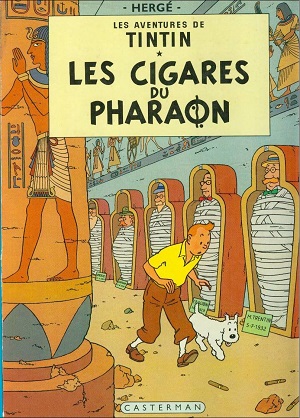 There is a subtitle on Le Poison Qui Rend Fou that always intrigued me: "Ram-Ram Va Faire Pif Paf." What does this mean?
There is a subtitle on Le Poison Qui Rend Fou that always intrigued me: "Ram-Ram Va Faire Pif Paf." What does this mean?
Perhaps, you know the comic-strip The Adventures of Tintin, made by the Belgian author Hergé? He was the guy who invented the "ligne claire" (clear line) drawing style.
Yes I've heard of that comic-strip, as it is known in Japan. But I have never seen it myself.
In one of the adventures, "Cigars of the Pharaoh," an Egyptologist, the professor Sophocles Sarcophagus, is hit by a poisoned arrow. The poison is called: "The Poison of Madness" (or the poison of the Rajaijah juice). Due to this, the professor wanders through the Indian forest thinking he is the Pharaoh Ramses II. He has a gun and threatens Tin Tin by shouting "Ram-Ram is playing Bang-Bang..." Mmm, that lunacy when it is wandering through my head.
How about the theme of the album? Is there any meaning relating to a kind of social poison perhaps?
That could be the case, yes, you can understand the title as you want to. At a certain moment in his life, every human being chooses to hide from the reality of life and death. So, this poison could be drugs or alcohol or women or money or god or music... but, in all of the cases, it is only an instrument of flight.
Did you ever perform any of this material in concerts?
Yes, we used to play this material live, and, until now, we've played a transformed version of "Le Poison, Part 2 (Didi dans ta Chambre)."
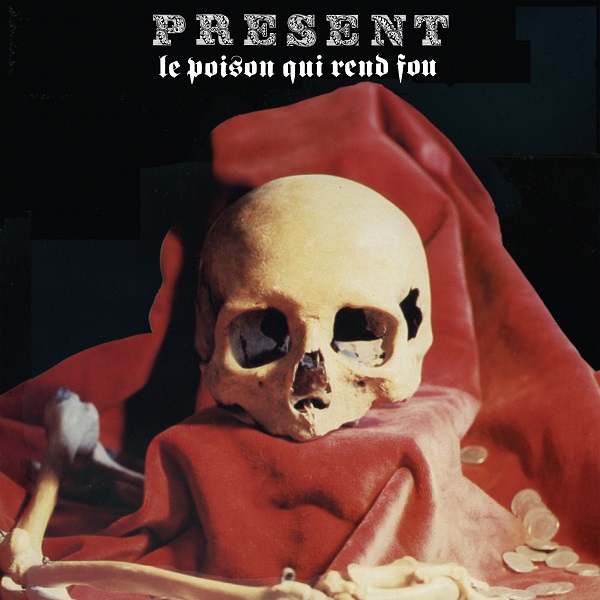 What was your musical activity during the eight-year break between the release of Le Poison Qui Rend Fou and C.O.D. Performance?
What was your musical activity during the eight-year break between the release of Le Poison Qui Rend Fou and C.O.D. Performance?
After recording Le Poison... we were to be produced by a French label, Atem Records, and several people were organizing a large European tour for the band. To cut a long story short, we'd been cheated by the producer (Gerard Nguyen — Atem Records). I had a lot of debts, the album was not released and all the work for the tour was lost forever. I was sickened by it! Thus I stopped the music and plunged into an ocean of alcohol. Alcohol was my principle thought and activity during this long break.
That's a real shame. I remember Nguyen's name from many releases on the Cryonic Records label. What he did to you makes me sick to hear about as well. Was all this before the album actually came out in 1985?
Originally, Atem Records was supposed to release the album. Steve [Feigenbaum] got in touch with me after this story and proposed to release it on Cuneiform Records instead. Thus I started to work with him.
Which European countries have you performed in?
Present has played in France, Belgium, Switzerland, Italy, Germany, The Netherlands, Austria, Czech Republic, Slovenia, and Hungary.
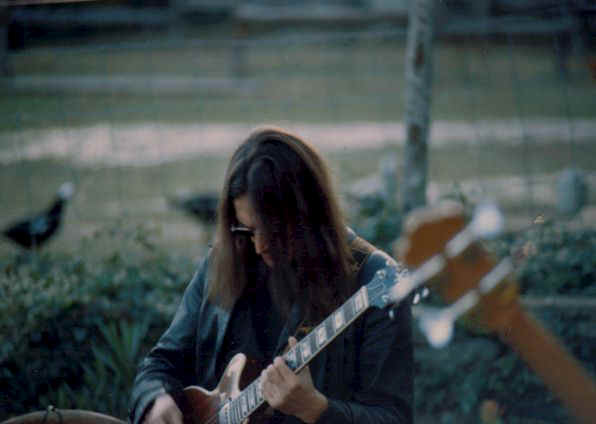 In which place did you find the best response?
In which place did you find the best response?
The case of Present is rather curious. You might be thinking by listening to the CDs that the music has to be complicated to the audience. On the contrary, Present's music passes easier onto the listener when it is played live. Live, Present is extremely powerful and the music works directly on the listener's emotions — the complexity becomes of minor importance. You might not understand because you never saw the band on stage and it is quite hard to understand this before having seen a concert. Only on stage will you discover Present's full dimension and amplitude. That's also why I cannot tell you if Present has a better response in such or such countries: Present's music is international — it is made of emotion. Pure emotion! We've met the same enthusiasm wherever we play — and we've played for the most different audiences: from jazz to hardcore festivals. The result is always the same: after some moments, the listener is disoriented, he doesn't know what to think of it — or what to feel of it. And some time later, depending from person to person, they get into the music and become really enthusiastic.
Yes I understand completely what you mean. I've had exactly the same kind of experience with audiences in performances myself.
To me, the audience that has the best reaction to my music is Italian... but yeah, I love that country.
Who is Martine de Bruyn (in the dedication on "Le Poison...")?
Martine has been at my side from the beginning of the Present adventure, and she still is. I would not have done the slightest part of what I was able to do if she wasn't there to encourage me. She is also the mother of Colin, my second son. Might be, she is the real poison that renders me insane...
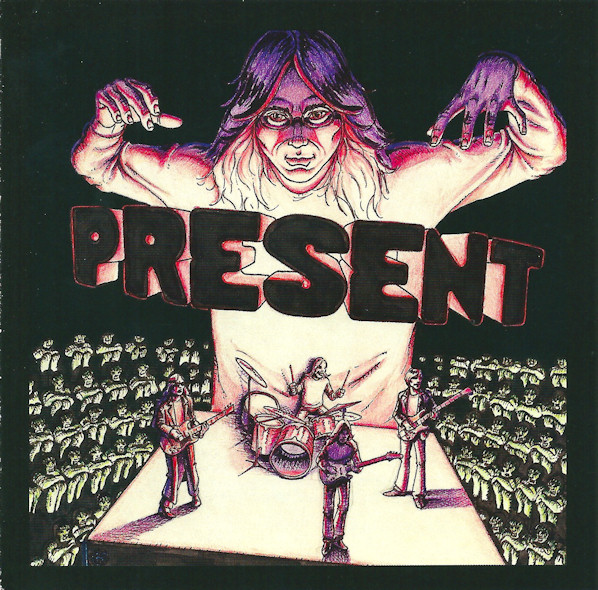 On the Live! CD you, Reginald and Bruno are credited with vocals. But can you tell me which member sings on each song?
On the Live! CD you, Reginald and Bruno are credited with vocals. But can you tell me which member sings on each song?
- "Laundry Blues"
- lead vocals : Roger
- backing : Reginald
- "Contre": Roger
- "Alone"
- lead vocals : Roger
- backing : Reginald
- with short interventions of Bruno
- "Promenade...":, Reginald
Arnold Schoenberg was someone who suffered from triskaidekaphobia. Was your first album at all influenced by him?
Not at all. You have to take the titles of the CDs and of the songs with a certain humor. I am not at all superstitious and I am free of religion. I like to play the role of a credulous person, credulous with excess, simply to make fun of that kind of person and, often, in a wicked way. I hate superstitious people and people who believe in whatever they are told to believe in. This is the main theme of the new album, Certitudes.
Do you have any other children who play music besides Reginald?
Not to my knowledge!
On the cover of C.O.D. Performance there is a tall tree trunk with a circular object at the top. I saw this also on a painting by Peter Brueghel the Elder. What is it?
It is a wheel. In the Middle Ages, a torture existed that consisted of letting die and letting rot a condemned person (whose limbs were all broken) attached to a wheel — some of those wheels were placed on top of a trunk.
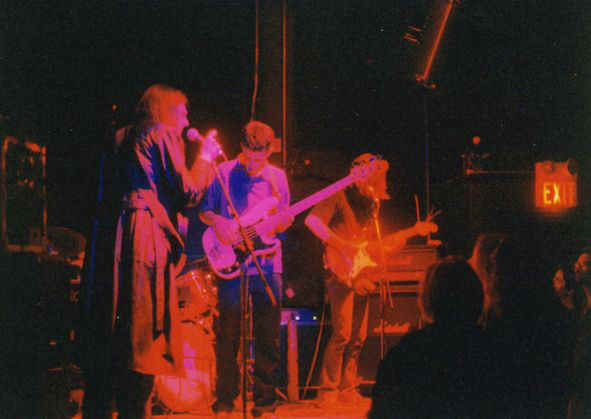 What happened between Live and Certitudes with the member changes? Did Bruno and Dave perform or rehearse any material from the latter recording?
What happened between Live and Certitudes with the member changes? Did Bruno and Dave perform or rehearse any material from the latter recording?
Dave went back to Denver after the European tour during November and December of '95, so Daniel took his place in the band. But we had to do some concerts with another drummer, Pierre Narcisse, as Daniel also plays with Art Zoyd and started up the Univers Zero project. He isn't free all of the time, you see. I asked Alain Rochette to play the piano on the new album, and he accepted. Hearing the results, I really wanted to have a piano on stage and not only on the album. But regarding concerts, on the contrary, he is not able to play with Present, due to his numerous other musical jobs. Miraculously, I met Pierre Chevalier while recording Certidues. He's very talented, and I found a lot of affinities between us. He will be the piano player in Present. Regarding Bruno Bernas, we could have killed him (unfortunately, we did not do it): the week before recording the CD, he simply decided to stop the music! I had to find a bass player in less than one week... Guy Segers accepted, and the rest is history by now. When we finished recording the album, I had to look for another bassist for the concerts. A musician friend of Reginald seemed to show some interest for the job. We tested the guy and accepted him. We've already played the new material with those two new musicians: the critics were positive — unanimously. From now on, Present will be: me, Reginald Trigaux, Daniel Denis, Pierre Chevalier, and Jean-Pierre Mendes. During the U.S. tour (May of '98), Dave Kerman will be our drummer, and I'm looking forward to playing with him again. He is incredible, nuts, unwise, funny... but most of all, he is one of the best drummers I've ever met!
Do you have any classical music education?
No, I am what you call a completely self-taught musician. I learned to read and write music due to the people I worked with — several of whom have had a classical formation. I learned on my own with elementary books as my only company. The writing of music is not a goal to me, it is a way to reach the place I want to go to.
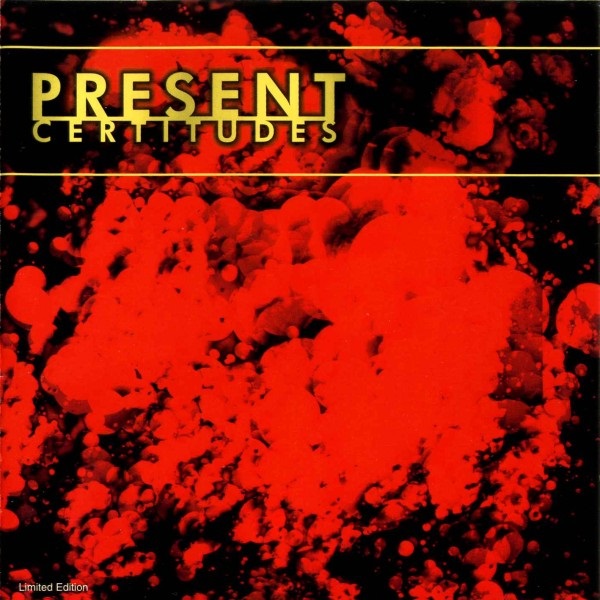 That's a nice way to put it. I definitely agree. What about Present's popularity — do you think it is easier now to play this kind of music? Or was the situation better back in the early 80s when the group started? Many people believe that the audience for adventurous rock music now is bigger, but I think not. There are certainly more distributors and magazines than ever before. And that gives people the illusion that it is making some kind of comeback.
That's a nice way to put it. I definitely agree. What about Present's popularity — do you think it is easier now to play this kind of music? Or was the situation better back in the early 80s when the group started? Many people believe that the audience for adventurous rock music now is bigger, but I think not. There are certainly more distributors and magazines than ever before. And that gives people the illusion that it is making some kind of comeback.
It is difficult to talk about popularity when your CDs are produced and distributed in a parallel circuit. Many of those labels shut themselves in in an intellectual auto-satisfaction and forget to sell their products to a potential audience. I do not mean that it is an easy job, it is hard and complex, but the mentality in which those people work has to change. It is only from the moment [when] we will be produced and distributed by a main label that we will be able to measure the popularity of a band like Present. If Present had the same promotional budget as a more or less commercial band, I am certain that this kind of music would be accepted by a lot of people — a lot more than is the case now. I think it is good to fight against the stupidity in the world; that's what I do. The 80s were hard for this music. The best period was the early 70s — people were open and curious, and, unfortunately, this feeling vanished.
Filed under: Profiles, Interviews, Issue 14
Related artist(s): Univers Zéro, Present
What's new
These are the most recent changes made to artists, releases, and articles.
- Review: Steve Tibbetts - Close
Published 2026-02-28 - Release: We Stood Like Kings - Pinocchio
Updated 2026-02-27 19:24:02 - Release: Stephen Grew - Pianoply
Updated 2026-02-27 19:20:11 - Release: Thierry Zaboitzeff - Artefacts
Updated 2026-02-27 00:16:46 - Review: Kevin Kastning - Codex I & Codex II
Published 2026-02-27 - Release: Zan Zone - The Rock Is Still Rollin'
Updated 2026-02-26 23:26:09 - Release: The Leemoo Gang - A Family Business
Updated 2026-02-26 23:07:29 - Release: Ciolkowska - Bomba Nastoyashchego
Updated 2026-02-26 13:08:55 - Review: Immensity Crumb - Chamber Music for Sleeping Giants
Published 2026-02-26 - Release: The Gatekeepers - Diary of a Teenage Prophet
Updated 2026-02-25 15:55:58 - Review: Mars Lasar - Grand Canyon
Published 2026-02-25 - Listen and discover: Mordecai Smyth will not break your back
Published 2026-02-25 - Release: Tashi Wada - What Is Not Strange?
Updated 2026-02-24 14:56:16 - Artist: Tashi Wada
Updated 2026-02-24 14:54:34 - Release: Greg Segal - Maintain!
Updated 2026-02-24 00:38:03 - Review: Il Segno del Comando - Sublimazione - Live
Published 2026-02-24 - Review: Nektar - Mission to Mars & Fortyfied
Published 2026-02-23 - Review: Jaime Rosas - Tres Piezas de Rock Progresivo
Published 2026-02-22
